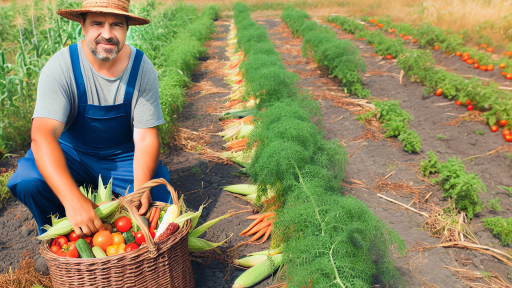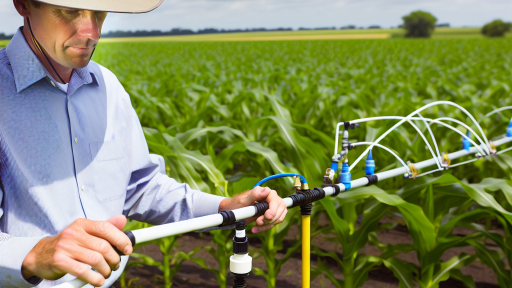Defining Community Supported Agriculture and its Importance
Understanding Community Supported Agriculture
Community Supported Agriculture, or CSA, connects farms with local consumers.
In a CSA, members financially support a farm upfront.
This model allows farmers to manage their cash flow better.
Furthermore, members receive fresh produce throughout the growing season.
Thus, CSAs foster a strong bond between producers and consumers.
Benefits of Community Supported Agriculture
CSAs offer numerous advantages for both members and farmers.
- Members enjoy access to fresh, seasonal produce.
- They often receive unique varieties not found in stores.
- Moreover, consumers gain knowledge about sustainable farming practices.
Farmers also benefit in several ways.
- They gain reliable income at the start of the season.
- Additionally, they cultivate a loyal customer base.
- Importantly, they reduce marketing costs through direct sales.
Cultivating Community Connections
CSAs enhance community engagement through local involvement.
Members often visit farms for pick-your-own days and events.
This interaction strengthens local food systems.
Ultimately, CSAs foster a sense of community pride.
Benefits of Engaging the Community in CSA Initiatives
Strengthening Community Bonds
Engaging the community fosters strong relationships among its members.
These connections create a network of support for local farmers.
Consequently, this network encourages collaborative events and activities.
Enhancing Food Security
Community Supported Agriculture enhances local food security.
Transform Your Agribusiness
Unlock your farm's potential with expert advice tailored to your needs. Get actionable steps that drive real results.
Get StartedPeople gain access to fresh, seasonal produce through local farms.
Furthermore, this reduces dependency on distant food sources.
Educating the Public
Engaging in CSA initiatives offers valuable education on agriculture.
Workshops and farm tours provide hands-on learning experiences.
As a result, community members develop a deeper understanding of food production.
Promoting Sustainable Practices
Active community participation promotes sustainable farming practices.
This leads to more environmentally friendly agricultural methods.
Ultimately, it helps preserve local ecosystems for future generations.
Boosting Local Economies
Participating in CSA initiatives stimulates the local economy.
Members invest in local farms, which boosts revenue for growers.
Additionally, this investment keeps money circulating within the community.
Strategies for Building Relationships between Farmers and Community Members
Organizing Community Events
Community events create valuable networking opportunities for everyone involved.
Farmers can host open farm days to show their practices.
Workshops on sustainable farming techniques engage local residents.
Additionally, potlucks featuring local produce bring people together.
This fosters a sense of community around agriculture.
Encouraging Open Communication
Promoting open dialogue builds trust between farmers and community members.
Farmers should create platforms for sharing updates and challenges.
For example, newsletters can share farm news and seasonal recipes.
Social media also offers a quick way to communicate and engage.
Consider hosting Q&A sessions to address community questions.
Implementing Food Subscription Services
Food subscription services strengthen connections to local farms.
Community Supported Agriculture (CSA) programs offer fresh produce regularly.
Subscribers support farmers by pre-purchasing shares of the harvest.
Showcase Your Farming Business
Publish your professional farming services profile on our blog for a one-time fee of $200 and reach a dedicated audience of farmers and agribusiness owners.
Publish Your ProfileThis creates financial stability for the farm and fresh food for families.
Moreover, subscribers feel more personally invested in the farm.
Fostering Collaboration on Local Projects
Collaborative projects enhance relationships within the community.
Farmers can partner with schools for educational gardening programs.
Community gardens also provide a venue for collective efforts.
These initiatives help educate residents about the importance of local agriculture.
Furthermore, joint projects create a shared sense of purpose.
Creating Volunteer Opportunities
Farm volunteer programs benefit both farmers and community members.
Volunteers gain hands-on experience in farming practices.
Farmers receive assistance with labor-intensive tasks during peak seasons.
This collaboration fosters strong bonds between participants.
Ultimately, it cultivates a commitment to supporting local agriculture.
Explore Further: Agri-Tourism Permits and Regulations for Farmers
Utilizing Social Media to Promote CSA Programs and Events
Leveraging Popular Platforms
Start by identifying key social media platforms suitable for your audience.
Platforms like Facebook, Instagram, and Twitter can enhance visibility.
Each platform has unique features to showcase your CSA program effectively.
For instance, use Instagram for vibrant visuals of your produce.
Leverage Facebook for event announcements and community engagement.
Creating Engaging Content
Produce high-quality content that resonates with your audience.
Share stories about your farm and the people behind it.
Highlight the benefits of community-supported agriculture clearly.
Use engaging images and videos to capture attention.
Incorporate customer testimonials to build trust and credibility.
Hosting Interactive Events
Organize interactive events to boost community involvement.
Consider virtual farm tours or cooking demonstrations.
Promote these events through live streaming on social platforms.
Encourage participation by engaging followers during the events.
Ask questions and respond to comments in real-time to foster connection.
Building a Community
Create a dedicated online group for your CSA members.
Foster conversations and share tips about sustainable farming.
Encourage members to share their experiences and recipes.
Recognize contributions to strengthen community bonds.
This sense of belonging enhances member retention and loyalty.
Measuring Success
Regularly analyze your social media metrics for insights.
Track engagement rates, likes, shares, and comments on your posts.
Use these analytics to refine your content strategy.
Identify which types of posts generate the most interest.
Adjust your approach based on feedback to improve outreach continuously.
Learn More: Natural Pest Control Solutions for Small Farms
Organizing Community Events
Workshops
Workshops are essential for engaging community members.
Showcase Your Farming Business
Publish your professional farming services profile on our blog for a one-time fee of $200 and reach a dedicated audience of farmers and agribusiness owners.
Publish Your ProfileThey allow participants to learn hands-on skills.
Consider topics like gardening, cooking, or preservation methods.
Local experts can lead these sessions effectively.
This approach builds relationships among attendees.
Participants can share their experiences and tips.
Also, workshops can be tailored to different age groups.
For example, children’s workshops can focus on fun activities.
Adults may prefer in-depth, practical knowledge.
Farm Tours
Farm tours create an immersive experience for participants.
They offer a behind-the-scenes look at agricultural practices.
Guests can see crops, livestock, and sustainable methods.
This transparency builds trust between farmers and consumers.
Promote local farms by inviting the community to visit.
Consider organizing seasonal tours to showcase different stages.
Provide guided tours to enhance the learning experience.
Additionally, include storytelling about farm history and practices.
Gather feedback from participants to improve future tours.
Tastings
Tasting events are a delicious way to engage the community.
Local produce can be showcased through various dishes.
Collaborate with local chefs or home cooks for diversity.
Pairing food with local beverages adds another layer.
Encourage attendees to interact and share their preferences.
These events create a vibrant atmosphere of camaraderie.
Also, consider including educational segments during tastings.
Inform participants about the farming methods behind the products.
Finally, tastings can encourage members to support local farmers.
See Related Content: Ethical Animal Farming Practices
Incorporating Community Feedback into CSA Program Development
Understanding Community Needs
Community feedback is vital for a successful Community Supported Agriculture (CSA) program.
It helps in identifying the specific needs of members.
Therefore, engaging with the community can significantly enhance the program.
Methods for Gathering Feedback
There are several effective methods to collect community feedback.
Surveys provide a structured approach to understanding preferences.
Focus groups allow for in-depth discussions among participants.
Moreover, suggestion boxes encourage anonymous input from members.
Social media platforms can also serve as valuable feedback channels.
Implementing Feedback
Collecting feedback is just the start; implementing it is crucial.
First, analyze the feedback for common themes and suggestions.
Next, prioritize changes that align with the community’s needs.
For example, if members request certain fruits or vegetables, include those in your offerings.
This responsiveness builds trust and loyalty within the community.
Showcase Your Farming Business
Publish your professional farming services profile on our blog for a one-time fee of $200 and reach a dedicated audience of farmers and agribusiness owners.
Publish Your ProfileCommunicating Changes
Ensure clear communication when implementing changes based on feedback.
Newsletters can summarize key alterations in the CSA program.
Organizing community meetings allows for direct interaction and explanation.
Additionally, social media updates can inform members quickly.
Continuous Improvement
Incorporating feedback should be an ongoing process.
Regularly check in with members to assess their satisfaction.
Consider holding seasonal feedback sessions to keep the dialogue open.
Ultimately, this continuous improvement mindset strengthens the CSA program.
Building a Stronger Community
Engaging with community members fosters a sense of belonging.
A responsive CSA not only meets food needs but also creates bonds.
Community members feel valued when their opinions shape the program.
This connection enhances their commitment to supporting local agriculture.
See Related Content: Farm-to-School: Boosting Local Farm Economies

Collaboration with Local Businesses and Organizations to Enhance CSA Visibility
Building Partnerships
Collaboration with local businesses strengthens community bonds.
These partnerships increase visibility for Community Supported Agriculture (CSA).
Engaging with local markets and shops promotes CSA offerings.
Choose businesses aligned with sustainable and local practices.
Creative Marketing Strategies
Joint marketing initiatives can attract a wider audience.
For instance, co-hosting events draws attention to both the CSA and the partner business.
Social media campaigns featuring local partners increase reach significantly.
Design unique promotions that highlight both parties’ contributions.
Involving Nonprofits and Community Organizations
Partnering with nonprofits enhances community engagement.
These organizations often have established networks.
Collaborate on events, workshops, or informational sessions.
Focus on educational outreach around local food systems.
Utilizing Local Media
Local newspapers and radio stations can amplify your message.
Create press releases highlighting your CSA’s initiatives.
Invite local journalists to cover events or story angles.
Leverage community bulletins to share CSA information broadly.
Engaging Customers as Ambassadors
Your CSA members can become effective advocates.
Encourage customers to share their experiences on social media.
Host gatherings where members can bring friends and family.
Provide incentives for referrals to draw new supporters.
Leveraging Educational Opportunities
School Programs
Integrating agriculture into school curriculums fosters a deeper understanding of food systems.
Students engage directly with local farms through field trips and hands-on experiences.
Programs like Farm to School link local farms to cafeterias, boosting local economies.
Teachers can incorporate gardening projects to teach science and environmental stewardship.
Moreover, students learn valuable skills, such as teamwork and responsibility.
Workshops for All Ages
Hosting community workshops encourages adult learning in sustainable agriculture practices.
Workshops cover topics like organic gardening, crop rotation, and pest management.
Showcase Your Farming Business
Publish your professional farming services profile on our blog for a one-time fee of $200 and reach a dedicated audience of farmers and agribusiness owners.
Publish Your ProfileThey also create platforms for community members to share experiences and tips.
These events often feature local experts and farmers, enhancing the learning experience.
In addition, participants gain confidence in growing their own food sustainably.
Partnerships with Local Organizations
Collaborating with nonprofits expands educational outreach efforts.
Organizations like Community Gardens provide resources for implementation and support.
These partnerships facilitate greater community involvement and awareness.
Furthermore, joint initiatives can create more extensive educational programs.
Ultimately, strong community ties foster healthier and more sustainable practices.
Encouraging Volunteer Participation to Strengthen Community Ties
The Importance of Community Engagement
Community engagement fosters strong connections among residents.
Volunteers become integral members of Community Supported Agriculture initiatives.
It creates a sense of ownership and pride in local food systems.
Moreover, engaged communities are more resilient and self-sufficient.
Creating Opportunities for Volunteer Involvement
Providing diverse volunteer opportunities enhances participation.
Programs should cater to various skill levels and interests.
Organize events such as plantings, harvests, and workshops.
Additionally, consider offering volunteer days for families and groups.
Building Relationships and Trust
Open communication builds trust among volunteers and farmers.
Regular updates through newsletters keep volunteers informed.
Encourage feedback to improve volunteer experiences.
Recognize volunteers’ efforts with appreciation events.
Utilizing Social Media and Marketing
Use social media platforms to reach a wider audience.
Share stories of volunteer impact to inspire others.
Highlight upcoming events and volunteer roles regularly.
Utilize local community boards to promote opportunities.
Training and Development for Volunteers
Provide training to equip volunteers with necessary skills.
Workshops on gardening, sustainable practices, and food preparation are valuable.
Offer mentorship programs that connect experienced members with newcomers.
Such initiatives increase volunteer confidence and competence.
Evaluating Volunteer Programs
Regular evaluations can enhance volunteer programs.
Collect feedback to understand volunteer needs and preferences.
Assess the effectiveness of programs in developing community ties.
Continuous improvement leads to greater volunteer satisfaction.
Additional Resources
From Georgia Farms to Emory Tables
The Local Food Movement: Definitions, Benefits & Resources | USU




